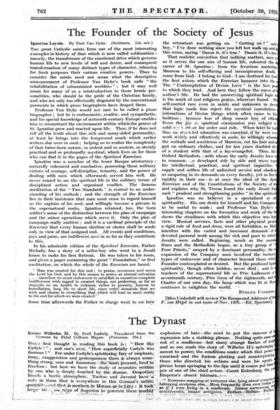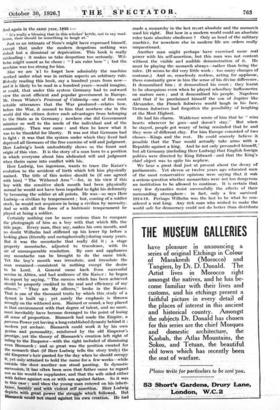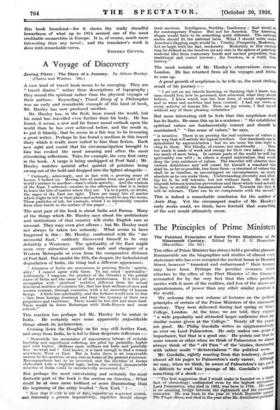The Dynast
Kaiser Wilhelm if. 'By Emil Ludwig. Translated from the
German by Ethel Colburn Mayne. (Putnams. 21s.)
• " •
ON1.1*S first thought in reading this book is : " How like Carlyle ! "; and one's'next, "How superficially Carlyle was German I"- • For under Carlyle's spluttering fury of emphasis, irony, exaggeration and grotesqueness there is always some- thing strong, sane and huinorons---the'S-CotiPensant, bred' in freedom : but here we have the study of neurotics Written by. one. who • is deeply touched by the , disease. Despotiim breeds a hectic atmosphere. Tacitus and Juvenal have a' note in them that is everywhere in this German's satiric . 4rlit3--isro That; .38 poWiere,yo. took, iongc!-, regn of Augustus to generate these morbid explosions of hate—the need to, put the rancour of repression into a stabbing phrase. Nothing quite Sane out of a . madhouse—but -many strange flashes of W- and as one reads the story. of Wilhelm U's upbringing, ..ascent to power, the conditions under which that power exercised and the -furious plotting and cotuiterplottig those who directed his. actions and were his agents. - phrase keeps springing to the lips until it comes pat from - pen of one of the .chief actors----Count Eulenburg, the Emperor's closest intimate, :—• " Everyone snapping at everyone else, lying about everyone, betraying everyone else. Ifore frequently than ever beioP.' as if were living in a madhouse. Insane. narnown,_!, 'controversies, insane' arrogenee: , . And again in the same year,,1393
" It's really a blessing that in this witches' kettle, not to say mad- house, their should be something to laugh at."
Just so an intimate of Nero's might have expressed himself, -except that under the modern .. despotism nothing was risked but a dismisial or deprivation. This book is really misleading : it makes us take despotism too seriously. Wil- helm might-assert as he choie i " r am ruler here " ; but the machine was too strong for him. Also we are 'é I to forget how admirably the machine worked Under what was in certain aspects an arbitrary rule. Nobody reading this book, say a hundred years from now= and it is likely to be read in a hundred years—would imagine, or could, that under this system Gerinany had to outward view the most efficient and popular government in Europe. Mr. Owen Wister's Pentecost of Calamity—one of the most notable utterances that the War produced—relates how, before the War, it seemed to him that nowhere else in the world did the citizen derive such advantages from belonging to the State as in Germany ; nowhere else did • Government minister so well to the needs of the individual and of the community. Then war came : and then he knew what it was to be thankful for liberty. It was not that Germans had to fight : it was that the system under which they lived had deprived all Germans of the free exercise of will and judgment. Herr Ludwig's book undoubtedly shows us the fount and origin of this vice. It is the story of a man born to a position in which everyone about him abdicated will and judgment when theirs came into conflict with his.
Herr Ludwig, too ingenious, wants to trace the Kaiser's evolution to the accident of birth which left him physically mained. The title of this notice should be (if one agreed with him) " The Withered Arm "—for, in his view if this boy with the sensitive slack mouth had been physically normal he would not have been impelled to fight his deformity by becoming the soldier at all points. He was—so says Herr Ludwig—a civilian by temperament ; but, coming of a soldier stock, he would not acquiesce in being a civilian by necessity. And so with all the force of a histrionic temperament he played at being a soldier.. Certainly nothing can be more curious than to compare the photograph of him as a boy with that which fills the title page. Every man, they say, makes his own mouth, and no doubt Wilhelm had stiffened up his lower lip before a looking glass (literally and metaphorically) during many years. But it was the moustache that really did it ; a stage property moustache, • adjusted to truculence, with its air of unconquerable resolution. By care and appliances any moustache can be. brought to do the same trick. Yet the boy's mouth was irresolute, and irresolute the man remained—consistent in nothing except the desire to be Lord. A General came back from successful service in Africa, and had audience of the Kaiser : he began his report by saying, " The success which has been achieved should be properly credited to the zeal and efliciency of my officers." ",They are My officers," broke in the Kaiser. That is one of the thousand traits by which this study of a dynast is built up ; yet surely the emphasis is thrown wrongly on the withered arm. Maimed or sound, a boy placed in that environment with that degree of talent, and no more, must inevitably have become deranged to the point of losing all sense of proportion. Bismarck had made the Empire, a Parvenu Power yet having a long established dynasty behind it ; modem yet archaic. Bismarck could work it by his own genius and personality, reinforced by the old. Emperor's prestige, yet the theory of Bismarck's creation left right of ruling to the Emperor—with the right included of dismissing even Bismarck ; and so, great was the position created for the monarch that' (if Herr Ludwig tells the story truly) the .old Emperor's-heir-panted for the day when he should occupy yet Only attained to hold the name fora feW-weeks—while outside the door another son stood panting. In dynastic succession,' it-has" often been seen that father came to regard son as his would-be supplanter, and that the wife sided either with father against-son or with son against father. So it was
this case ; andl-then the young man entered on his inheri-
tance, and with Violent self assertion. Heir Ludwig depicts with great power the struggle which folloWed. But Bismarck could not ttand skainit hie own creation. He had made a monarchy in the last resort absolute and the monarch used his right; But how in a modern world could an absolute ruler taste absolute obedience ? Only as head of the military machine; for nowehere else in modern' life are orders really
• unquestioned:
Another man might perhaps • have exercised more real power with his self-assertion, but this man was not content without the visible and audible demonstration of it. He must be playing the monarch always—rather than being the ruler. (It seems he did very little work : too many changes of costume.) - And so; ceaselessly restless, acting for applause, there constantly grew in him the sense of his divine difference. It demoralized him ; it demoralized his court ; they learnt to be obsequious -even when he played schoolboy buffooneries on mature men ; and it demoralized his people. Napoleon said that if he proclaimed himself the son of Jupiter like Alexander, the French fishwives would laugh in his face. 'Geri-Mtn fishwives had forgotten the possibility of laughing at the Most Highest. He had his charm. Waldersee wrote of him that lie " wins hearts whereVer he goes—and doesn't stay." But when he stayed, people got weary of being reminded that he and 'they were of different clay. For him Europe consisted of two classes—Kings and the rest. He could scarcely believe it possible that the Tsar would actually take arms with a Republic against a king. And he not only persuaded himself,' but all Germany (including Herr Ludwig) that English foreign politics were directed by King Edward—and that the King's chief object was to spite his nephew.
We hear a great deal just at present about the decay of parliaments. Yet eleven or twelve years ago educated men of the most conservative opinions were saying- that it wak a serious question whether monarchies were not too dangerous an institution to be allowed to continue. It is certain that very few dynasties resist successfully the effects of their surrounding atmosphere : in fact, only a few survived 1914-18. Perhaps Wilhelm was the last to be what he con- sidered a real king. Any rich man who wished to make the world safe for democracy could not do better than distribute this book broadcast—for it shows the really dreadful inwardness of what up to 1914 seemed one of the most creditable monarchies in Europe. It is, of course, much more interesting than any novel ; and the translator's work is done with remarkable verve. -
STEPHEN GWYNN.




























































 Previous page
Previous page